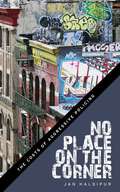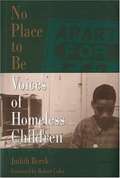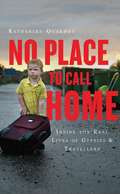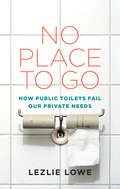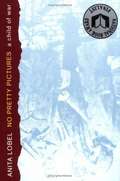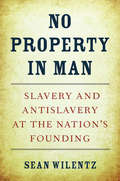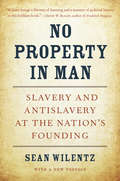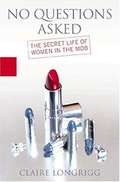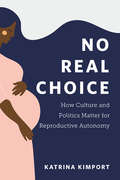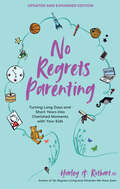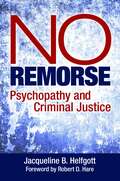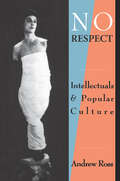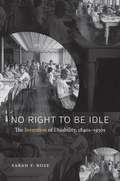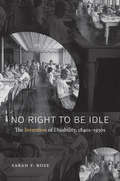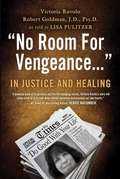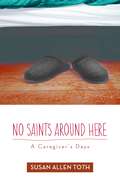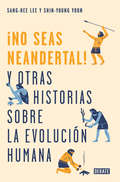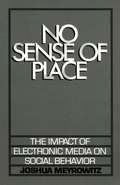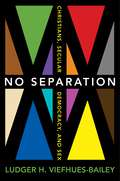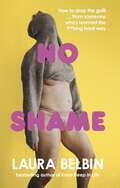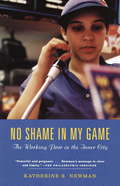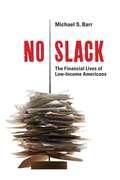- Table View
- List View
No Place on the Corner: The Costs of Aggressive Policing
by Jan HaldipurWinner, 2019 Goddard Riverside Stephan Russo Book Prize for Social Justice, given by the Goddard Riverside Community CenterThe impact of stop-and-frisk policing on a South Bronx community What’s it like to be stopped and frisked by the police while walking home from the supermarket with your young children? How does it feel to receive a phone call from your fourteen-year-old son who is in the back of a squad car because he laughed at a police officer? How does a young person of color cope with being frisked several times a week since the age of 15? These are just some of the stories in No Place on the Corner, which draws on three years of intensive ethnographic fieldwork in the South Bronx before and after the landmark 2013 Floyd v. City of New York decision that ruled that the NYPD’s controversial “stop and frisk” policing methods were a violation of rights. Through riveting interviews and with a humane eye, Jan Haldipur shows how a community endured this aggressive policing regime. Though the police mostly targeted younger men of color, Haldipur focuses on how everyone in the neighborhood—mothers, fathers, grandparents, brothers and sisters, even the district attorney’s office—was affected by this intense policing regime and thus shows how this South Bronx community as a whole experienced this collective form of punishment. One of Haldipur’s key insights is to demonstrate how police patrols effectively cleared the streets of residents and made public spaces feel off-limits or inaccessible to the people who lived there. In this way community members lost the very ‘street corner’ culture that has been a hallmark of urban spaces. This profound social consequence of aggressive policing effectively keeps neighbors out of one another’s lives and deeply hurts a community’s sense of cohesion. No Place on the Corner makes it hard to ignore the widespread consequences of aggressive policing tactics in major cities across the United States.
No Place to Be: Voices of Homeless Children
by Judith BerckThe stories and poems of actual homeless children--including fourteen-year-old Kareem, who lives in a city shelter -- depict the reality of homelessness in America, illustrating what it means to be deprived of the things most people take for granted.
No Place to Call Home: Inside the Real Lives of Gypsies and Travellers
by Katharine QuarmbyThey are reviled. For centuries the Roma have wandered Europe; during the Holocaust half a million were killed. After World War II and during the Troubles, a wave of Irish Travellers moved to England to build a better, safer life. They found places to settle down--but then, as Occupy was taking over Wall Street and London, the vocal Dale Farm community was evicted from their land. Many did not leave their homes quietly; they put up a legal--and at times physical--fight.Katharine Quarmby, an award-winning journalist who has reported on Gypsies and Travellers in The Economist for the past seven years, takes us into the heat of the battle, following the Sheridan, McCarthy, Burton and Townsley families before and after the eviction, from Dale Farm to Meriden, in the heart of England, and other trouble spots. Based on exclusive access and rich historical research, No Place to Call Home is a deeply moving and stunning narrative of long-sought justice.
No Place to Cry: The Hurt and Healing of Sexual Abuse
by Doris Vanstone Erwin W. LutzerJeremiah knew that healing was possible. God's name is Jehovah Rapha, which means the God who heals, and God has a balm, a healing salve--His Word. That's why Jeremiah was dismayed. He knew that there was no wound or hurt so great, so horrible, so seemingly destructive that our sovereign God could not heal it. He is God, the God of all flesh, and nothing is too hard for Him. If there is any story that will illustrate this truth, you will find it within the covers of No Place to Cry.
No Place To Go: How Public Toilets Fail Our Private Neds
by Lezlie LoweFrom pay potties to deserted alleyways, and in cities from London to San Francisco to Toronto, No Place To Go talks about where we go in public. It’s a marriage of urbanism, social narrative, and pop culture that shows the ways -- momentous and mockable -- public bathrooms just don't work. Like, for the homeless who, faced with no place to go literally take to the streets. (Ever heard of a municipal poop map?) For people with invisible disabilities, such as Crohn’s disease, who stay home rather than risk soiling themselves on public transit. For girls who quit sports teams because they don’t want to run to the edge of the pitch to pee. Bathroom bills that will stomp on the rights of trans people dominate the news. And where was Hillary Clinton before she arrived back to the stage late after a commercial break during the live Democratic leadership debate in December 2015? Stuck in a queue for the women’s toilet.Peel back the layers on public bathrooms and it's clear many more people want for good access than have it. Public bathroom access is about cities, society, design, movement, and equity. The real question is: Why are public toilets so crappy?
No Pretty Pictures: A Child of War
by Anita LobelA finalist for the National Book Award, Lobel's unforgettable memoir paints a disturbing picture of a child hiding from the Nazis in World War II. Since coming to the United States as a teenager, Lobel has spent her life as an author and illustrator of picture books.
No Property in Man: Slavery and Antislavery at the Nation's Founding (The Nathan I. Huggins lectures #18)
by Sean WilentzDriving straight to the heart of the most contentious issue in American history, Sean Wilentz argues controversially that, far from concealing a crime against humanity, the U.S. Constitution limited slavery’s legitimacy—a limitation which in time inspired the antislavery politics that led to Southern secession, the Civil War, and Emancipation.
No Property in Man: Slavery and Antislavery at the Nation’s Founding, With a New Preface (The Nathan I. Huggins Lectures #18)
by Sean WilentzDriving straight to the heart of the most contentious issue in American history, Sean Wilentz argues controversially that, far from concealing a crime against humanity, the U.S. Constitution limited slavery’s legitimacy—a limitation which in time inspired the antislavery politics that led to Southern secession, the Civil War, and Emancipation.
No Questions Asked: The Secret Life of Women in the Mob
by Clare LongriggCarmela Soprano has set the gold standard for our image of the American mob woman: a loyal materfamilias devoted to her family and her church, not to mention her exquisite Italian cooking. But beyond the teased-out hair and frosted nails, she is smart, savvy, and, at times, morally conflicted about her role in her husbands world. gets to the heart of this complex existence in No Questions Asked, an investigation of the real women in today's American Mafia. Longrigg delved into the hidden depths of the American mob society and discovered a subculture of powerful women in the midst of the Mafia patriarchy. From New Jersey to Chicago, Miami to LA, she interviewed the wives, mothers, daughters, and mistresses of "made men" to find out how they functioned in this deadly underworld. Some are irresistibly attracted to dangerous men-like Camille Serpico, who married her first husband's killer, and Lana Zancocchio, daughter of the reputed Bonanno family consigliere, who calls her terrifying father a "real man." Others, like Brenda Colletti, take part in criminal activities alongside their men, covering up for them with the police and plotting mob hits. And there are those who rebel, like Betty Tocco: to save her son from a life of crime, she conspired with the Feds to send her mob boss of a husband to jail for two hundred years. Longrigg profiles this fascinating cast of characters and their sacrifices, as well as their own uses and abuses of power. Looking at the women born into the Family and those who are inexplicably attracted to it, Longrigg portrays their struggles with identity, self-confidence, and conscience. Based on her unique access to the women behind the Mafia, and the first unprecedented glimpse into a fierce private, lethally complicated world. CLARE LONGRIGG is the author of Mafia Women an expose of women in the Mafia in Italy, writes for the Independent and the Guard in London, where she lives.
No Real Choice: How Culture and Politics Matter for Reproductive Autonomy (Families in Focus)
by Katrina KimportIn the United States, the “right to choose” an abortion is the law of the land. But what if a woman continues her pregnancy because she didn’t really have a choice? What if state laws, federal policies, stigma, and a host of other obstacles push that choice out of her reach? Based on candid, in-depth interviews with women who considered but did not obtain an abortion, No Real Choice punctures the myth that American women have full autonomy over their reproductive choices. Focusing on the experiences of a predominantly Black and low-income group of women, sociologist Katrina Kimport finds that structural, cultural, and experiential factors can make choosing abortion impossible–especially for those who experience racism and class discrimination. From these conversations, we see the obstacles to “choice” these women face, such as bans on public insurance coverage of abortion and rampant antiabortion claims that abortion is harmful. Kimport's interviews reveal that even as activists fight to preserve Roe v. Wade, class and racial disparities have already curtailed many women’s freedom of choice. No Real Choice analyzes both the structural obstacles to abortion and the cultural ideologies that try to persuade women not to choose abortion. Told with care and sensitivity, No Real Choice gives voice to women whose experiences are often overlooked in debates on abortion, illustrating how real reproductive choice is denied, for whom, and at what cost.
No Regrets Parenting: Turning Long Days and Short Years into Cherished Moments with Your Kids
by Harley A. Rotbart&“A busy parent&’s time management guide, demonstrating how to find balance . . . and transform everyday routines into special times.&” —Publishers Weekly No Regrets Parenting focuses on the simple truth that the long days of busy parenting race quickly by and, looking back someday, the years with kids will feel far too short. Written by renowned pediatrician and distinguished parenting expert, Dr. Harley Rotbart, No Regrets Parenting teaches parents how to experience the joy of raising kids amidst the chaos of daily routines. Carpool, bedtime, bath time, soccer practice, homework, dinner hour, and sleepovers all become more than just hurdles to overcome. They become opportunities for intimate and meaningful time with kids— opportunities to turn fleeting minutes into memorable moments. With up to date content addressing the needs of today&’s busy families as well as two brand new sections –one on parenting adult children and another on grandparenting--this updated and expanded edition answers the ageless question: How can you do it all…and stay sane in the process? &“No Regrets Parenting is something special, and something a little different. Dr. Rothbart writes to help us turn painfully long minutes into funny moments. . . . It&’s more about being a parent than it is about actually parenting the kids themselves.&” —New York Times &“A gem of a book.&” —Harvey Karp, MD, creator of the New York Times bestselling books and DVDs The Happiest Baby on the Block and The Happiest Toddler on the Block &“Working parent or stay-at-home mom or dad, Dr. Rotbart&’s wise advice and refreshing ideas will make you want to pick up this book again and again.&” —Parents magazine
No Remorse: Psychopathy and Criminal Justice
by Jacqueline B. HelfgottPsychopathy and Criminal Justice provides a comprehensive examination of the empirical research and cultural understanding of psychopathy. The book examines ways in which the construct and concept of psychopathy have made their way into criminological theory and criminal justice practice.<p><p>It offers a focused look at how the term "psychopath" is used and understood in law enforcement, the courts, corrections, victim services, and juvenile justice. Additionally, it examines historical, research, and cultural perspectives on psychopathy for understanding criminal behavior, exploring theories of and research into psychopaths, psychopathy and gender, and representations of psychopaths in film and literature.
No Respect: Intellectuals and Popular Culture
by Andrew RossThe intellectual and the popular: Irving Howe and John Waters, Susan Sontag and Ethel Rosenberg, Dwight MacDonald and Bill Cosby, Amiri Baraka and Mick Jagger, Andrea Dworkin and Grace Jones, Andy Warhol and Lenny Bruce. All feature in Andrew Ross's lively history and critique of modern American culture. Andrew Ross examines how and why the cultural authority of modern intellectuals is bound up with the changing face of popular taste in America. He argues that the making of "taste" is hardly an aesthetic activity, but rather an exercise in cultural power, policing and carefully redefining social relations between classes.
No Right To Be Idle: The Invention Of Disability, 1850-1930
by Sarah F. Rose<P><P>During the late nineteenth and early twentieth centuries, Americans with all sorts of disabilities came to be labeled as "unproductive citizens." Before that, disabled people had contributed as they were able in homes, on farms, and in the wage labor market, reflecting the fact that Americans had long viewed productivity as a spectrum that varied by age, gender, and ability. But as Sarah F. Rose explains in No Right to Be Idle, a perfect storm of public policies, shifting family structures, and economic changes effectively barred workers with disabilities from mainstream workplaces and simultaneously cast disabled people as morally questionable dependents in need of permanent rehabilitation to achieve "self-care" and "self-support." <P><P> By tracing the experiences of policymakers, employers, reformers, and disabled people caught up in this epochal transition, Rose masterfully integrates disability history and labor history. She shows how people with disabilities lost access to paid work and the status of "worker--a shift that relegated them and their families to poverty and second-class economic and social citizenship. This has vast consequences for debates about disability, work, poverty, and welfare in the century to come.
No Right to Be Idle: The Invention of Disability, 1840s–1930s
by Sarah F. RoseDuring the late nineteenth and early twentieth centuries, Americans with all sorts of disabilities came to be labeled as "unproductive citizens." Before that, disabled people had contributed as they were able in homes, on farms, and in the wage labor market, reflecting the fact that Americans had long viewed productivity as a spectrum that varied by age, gender, and ability. But as Sarah F. Rose explains in No Right to Be Idle, a perfect storm of public policies, shifting family structures, and economic changes effectively barred workers with disabilities from mainstream workplaces and simultaneously cast disabled people as morally questionable dependents in need of permanent rehabilitation to achieve "self-care" and "self-support." By tracing the experiences of policymakers, employers, reformers, and disabled people caught up in this epochal transition, Rose masterfully integrates disability history and labor history. She shows how people with disabilities lost access to paid work and the status of "worker--a shift that relegated them and their families to poverty and second-class economic and social citizenship. This has vast consequences for debates about disability, work, poverty, and welfare in the century to come.
No Room for Vengeance: In Justice and Healing
by Victoria Ruvolo Robert Goldman Lisa PulitzerA true story of a teenage prank gone wrong, the woman whose life it nearly took, and what can happen when justice and forgiveness step ahead of the need for vengeance. Holiday season 2004. A snowy night. Two friends driving home from a family event. Teenagers on a joy ride, out for a night of mischief. And an incident that makes front page news in New York and beyond.
No Saints around Here: A Caregiver’s Days
by Susan Allen TothWhen we promise &“in sickness and in health,&” it may be a mercy that we don&’t know exactly what lies ahead. Forcing food on an increasingly recalcitrant spouse. Brushing his teeth. Watching someone you love more than ever slip away day by day. As her husband James&’s Parkinson&’s disease with eventual dementia began to progress, writer Susan Allen Toth decides she intensely wants to keep her husband at home—the home he designed and loved and lived in for a quarter century—until the end.No saint, as she often reminds the reader, Toth found solace in documenting her days as a caregiver. The result, written in brief, episodic bursts during the final eighteen months of James&’s life, has a rare and poignant immediacy. Wrenching, occasionally peevish, at times darkly funny, and always deeply felt, Toth&’s intimate, unsparing account reflects the realities of seeing a loved one out of life: the critical support of some friends and the disappearance of others; the elasticity of time, infinitely slow and yet in such short supply; the sheer physicality of James&’s decline and the author&’s own loneliness; the practical challenges—the right food, the right wheelchair, the right hospital bed—all intricately interlocking parts of the act of loving and caring for someone who in so many ways is fading away.&“We all need someone to hear us,&” Toth says of the millions who devote their days to the care of a loved one. Her memoir is at once an eloquent expression of that need and an opening for others. No Saints around Here is the beginning of a conversation in which so many of us may someday find our voices.
No seas neandertal: y otras historias sobre la evolución humana
by Sang-Hee Lee Shin-Young YoonEn este fascinante best seller internacional, la paleoantropóloga coreana Sang-Hee Lee explora y cuestiona algunas de las asunciones evolutivas más importantes con resultados del todo inesperados. ¿Qué información pueden darnos unos dientes fosilizados sobre la esperanza de vida de nuestros ancestros? ¿Fue la agricultura un paso en falso en la evolución humana? ¿Cómo pueden unas simples comparaciones geométricas de cráneos y fósiles pélvicos sugerir un posible origen de nuestra naturaleza social? ¿Qué tenemos realmente en común con los neandertales? A través de una serie de jugosos capítulos, este libro nos ofrece nuevas perspectivas sobre nuestros primeros antepasados homínidos, desafiando las percepciones sobre la progresión tradicional de la evolución. Al combinar una visión antropológica con una investigación vanguardista e innovadora, las sorprendentes conclusiones de Lee arrojan nueva luz sobre los comienzos de la humanidad y nos conectan con nuestro pasado más remoto. No seas neandertal es el libro perfecto para todos aquellos curiosos que quieren otra historia sobre nuestros orígenes y todo el proceso que nos ha traído hasta aquí. A medida que avanzamos en el camino evolutivo, Lee nos ayuda a determinar hacia dónde nos dirigimos y aborda una de nuestras preguntas científicas más apremiantes: ¿sigue evolucionando la humanidad?
No Second Chance
by Human Rights WatchDecent and stable housing is essential for human survival and dignity, a principle affirmed both in U.S. policy and international human rights law. The United States provides federally subsidized housing to millions of low-income people who could not otherwise afford homes on their own. U.S. policies, however, exclude countless needy people with criminal records, condemning them to homelessness or transient living. Exclusions based on criminal records ostensibly protect existing tenants. There is no doubt that some prior offenders still pose a risk and may be unsuitable neighbors in many of the presently-available public housing facilities. But U.S. housing policies are so arbitrary, overbroad, and unnecessarily harsh that they exclude even people who have turned their lives around and remain law-abiding, as well as others who may never have presented any risk in the first place.
No Sense of Place: The Impact of Electronic Media on Social Behavior
by Joshua MeyrowitzHow have changes in media affected our everyday experience, behavior, and sense of identity? Such questions have generated endless arguments and speculations, but no thinker has addressed the issue with such force and originality as Joshua Meyrowitz in No Sense of Place. Advancing a daring and sophisticated theory, Meyrowitz shows how television and other electronic media have created new social situations that are no longer shaped by where we are or who is "with" us. While other media experts have limited the debate to message content, Meyrowitz focuses on the ways in which changes in media rearrange "who knows what about whom" and "who knows what compared to whom," making it impossible for us to behave with each other in traditional ways. No Sense of Place explains how the electronic landscape has encouraged the development of: -More adultlike children and more childlike adults; -More career-oriented women and more family-oriented men; and -Leaders who try to act more like the "person next door" and real neighbors who want to have a greater say in local, national, and international affairs. The dramatic changes fostered by electronic media, notes Meyrowitz, are neither entirely good nor entirely bad. In some ways, we are returning to older, pre-literate forms of social behavior, becoming "hunters and gatherers of an information age." In other ways, we are rushing forward into a new social world. New media have helped to liberate many people from restrictive, place-defined roles, but the resulting heightened expectations have also led to new social tensions and frustrations. Once taken-for-granted behaviors are now subject to constant debate and negotiation. The book richly explicates the quadruple pun in its title: Changes in media transform how we sense information and how we make sense of our physical and social places in the world.
No Separation: Christians, Secular Democracy, and Sex
by Ludger H. Viefhues-BaileyThrough a potent mix of authoritarianism, heterosexism, xenophobia, and ethnoracial nationalism, powerful illiberal Christian movements have upended liberal democracies in countries that were once seen as paradigms of secular governance. Ludger H. Viefhues-Bailey offers new insight into the foundations of these movements, demonstrating how they emerge from the contradictions at the intersection of secularism and democracy.No Separation examines recent conflicts that link national identity, religion, and sexuality: debates over Muslim veiling practices in Germany, same-sex marriage in France, and migration and abortion in the United States. In each case, illiberal Christianities portray popular sovereignty as threatened at the same time as they display an obsessive concern with the politics of sex and reproduction. Underlying these conflicts, No Separation shows, is the fundamental tension of democracy—who belongs to “the People.” Viefhues-Bailey argues that when secularism and democracy meet, cultural religions appear, seeking control over women’s bodies, national borders, and the racialized reproduction of the People in defense of the ideal of popular sovereignty.Connecting political theology, political philosophy, and the sociology of religion with gender and sexuality studies, No Separation is a deeply original analysis of the crisis of democracy and the limits of secularism. It also suggests alternative ways of imagining the People, proposing a more humane vision of borders, sexualities, and social bonds.
(No) Sex in Japan: A Sociology of Sexlessness in Intimate Relationships
by Alice PacherThis book presents a sociological perspective on (non-)sexual intimate relationships in contemporary Japan. The phenomenon of sexlessness in intimate relationships has gained increasing attention in popular culture. However, few scholarly investigations exist in examining this striking trend in Japan. This book presents an analysis of the socio-structural elements within both academic and public discourses in Japanese culture relating to sexlessness in intimate relationships. Drawing from original interview research, the author provides insights into individuals’ experiences and investigates the connection between sexual inactivity, sexuality and Japanese couples’ satisfaction and well-being in their relationships. The book discusses how work environment, childbirth, infertility treatments, as well as past sexual experiences, extramarital affairs, and both unmarried and married couple relationships influence individual sexual behavior and consciousness. A broad overview of the meaning of sexuality through a cultural comparison with discourses on sexuality and interview results in Germany and Austria is also provided. To this end, the book calls into question whether sexlessness is a unique Japanese phenomenon or whether parallels and similarities might also be found in Western societies. Bringing together academic and public discourses on sexless couples, this book engages a rethinking of the meaning of sexuality, love, intimacy and relationships, both in and outside of Japan. It is of interest to students and scholars of Japanese studies, gender, sexology and sociology.
No Shame: How to drop the guilt … from some who’s learned the f**king hard way
by Laura BelbinShame, shame we know your nameDo we own it? Being a woman that is. Do we fuck! We live in fear of how we look, what we eat, how we age and what we do. Wow, it's 2022 and we're still churning out that same old shit. I've been told as you get older you care less. Fucking great. I can't wait to be menopausal with skunk-like grey track lines in my hair, saggier tits, and miserable as shit. I don't know about you, but I'd quite like to have that experience - the no-fucks-experience that is - now, before that all happens. To have the confidence to believe in who I am. It's a push we all have to make - whether it be in our confidence over our bodies, who we are as people, or what goes on inside our mind - and we all have to work at it. It's baby steps. So let's take it back to those tiny steps, because all mountains that are climbed don't happen without practice, perseverance, self-belief and a fuck ton of work.
No Shame in my Game: The Working Poor in the Inner City
by Katherine S. Newman"Powerful and poignant. . . . Newman's message is clear and timely. " --The Philadelphia Inquirer InNo Shame in My Game, Harvard anthropologist Katherine Newman gives voice to a population for whom work, family, and self-esteem are top priorities despite all the factors that make earning a living next to impossible--minimum wage, lack of child care and health care, and a desperate shortage of even low-paying jobs. By intimately following the lives of nearly 300 inner-city workers and job seekers for two yearsin Harlem, Newman explores a side of poverty often ignored by media and politicians--the working poor. The working poor find dignity in earning a paycheck and shunning the welfare system, arguing that even low-paying jobs give order to their lives. No Shame in My Gamegives voice to a misrepresented segment of today's society, and is sure to spark dialogue over the issues surrounding poverty, working and welfare.
No Slack
by Michael S. BarrThe financial crisis exposed the potentially unsavory results of the interaction between low- and moderate income households and alternative and mainstream financial institutions. Many households were overleveraged or paid high costs for financial services, while others lacked access to useful financial products that can cushion against economic instability. The financial services system is not well designed to serve low- and moderate-income households, leaving them without financial slack: they did not have adequate breathing room for making the financial adjustments that would permit them to better meet their own needs. No Slack shows us why these families were the least prepared to handle the shock of the deep recession.This pivotal analysis focuses on the Detroit metropolitan area's low- and moderate-income neighborhoods, which are similar to those of other Rust Belt communities. The Detroit Area Household Financial Services study-conducted at the height of the subprime lending boom-examines these households' decisionmaking processes, behaviors, and attitudes toward a full range of financial transactions. No Slack reveals widespread problems in home mortgage lending, the common threads among people who file for bankruptcy, the reasons so many households are unbanked, and how behaviorally informed financial regulation can make the market work better. Drawing on his deep policy experience, Michael Barr advocates helping families seek financial stability in three primary ways: enhancing individuals' financial capability, using technology to promote access to financial products and services that meet their needs, and establishing strong protections for consumers.
